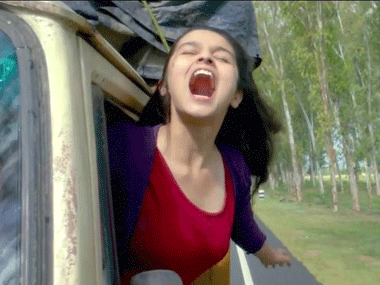It’s exciting to be back in Berlin for the 64th Berlin International Film Festival this year, not only because the festival boasts of an impressive lineup of world cinema, but because this year, as many as 10 Indian films have been selected at the Berlin film festival. This is a Kumbh Mela-like, rare planetary occurrence that India seldom enjoys at any of the A-list film festivals like Cannes, Berlin or Venice, unless there’s a spotlight on India. The 10-film strong Indian package at the Berlinale includes a range of features, documentaries, short and classic films. They capture the explosive vitality and diversity present in Indian cinema: seasoned Bollywood, a young student’s debut feature, a world classic of the 60s, a film on Dalit uprisings by a Malayali director based in New York, a short film in Tibetan, as well as an experimental film at the confluence of politics, voice and music from the bauxite bowels of Orissa. The films are Imtiaz Ali’s Highway, Pushpendra Singh’s Lajwanti, Jayan Cherian’s Papilio Buddha, Jessica Sadana and Samarth Dixit’s Prabhat Pheri, K. Hariharan and Mani Kaul’s Ghashiram Kotwal, Avinash Arun’s Killa, Gaurav Saxena’s Rangzen, Shambhavi Kaul’s Mount Song, Kush Badhwar’s Blood Earth and Satyajit Ray’s Nayak. Highway, which will have its world premiere at the Berlin film festival on 13 February, ahead of its worldwide release, marks a turning point in the work of this popular Bollywood director. Featuring Randeep Hooda and Alia Bhatt, this road movie explores unexpected undercurrents in the relationship between a kidnapper and his victim, with a powerful, un-Bollywoody punch in the climax. Pushpendra Singh’s Lajwanti (the Honour Keeper), a debut feature based on a Vijaydan Detha story, is a hauntingly beautiful art film about a Rajasthani woman in love with a gentle man obsessed with doves. Jayan Cherian’s Papilio Buddha explores Dalit uprisings and the degradation of women in rural Kerala. Jessica Sadana and Samarth Dixit’s Prabhat Pheri (“Journey with Prabhat”) is a wonderful feature-length documentary exploring the history and myths of the place where the Prabhat Film Company once stood, currently housing the Film and Television Institute of India. The stories they’ve compiled are gems, including one about a director who is apparently reborn as a snake. [caption id=“attachment_1376829” align=“alignleft” width=“380”]  Courtesy: Facebook[/caption] K. Hariharan and Mani Kaul’s Ghashiram Kotwal, is a special film as it was made in 1977 by the “Yukt film cooperative” consisting of FTII students, guided by their mentor, Mani Kaul. Amazingly, the only surviving print of this film is not in India, but with the Arsenal Institute for Film and Video Art in Berlin, which also organizes the International Forum of New Cinema and Forum Expanded sections of the Berlinale. The Forum will screen the restored, digital print of this film made by the Arsenal. Starring Mohan Agashe and Om Puri, it is set in venal Peshwa regime in Maharashtra. Avinash Arun’s Killa (Fort) in Marathi, is a confident debut in the Generation section. It is a coming of age story set in the Konkan, about a youngster whose single mother keeps getting transferred. Gaurav Saxena’s Rangzen (Freedom), a short film in Tibetan, is about a small boy beginning to sense what the word means. Shambhavi Kaul’s Mount Song and Kush Badhwar’s Blood Earth are experimental films shown in the Forum Expanded section, which looks at cinema that explores the relationship with other arts. Satyajit Ray’s classic Nayak (“The Hero”), starring Uttam Kumar and Sharmila Tagore, which was awarded ‘Special Recognition’ for the film and his life achievement in Berlin in 1966, will be shown — a restored print — in the Berlinale Classics section. With this lineup, even though it’s three degrees in Berlin, being an Indian at the festival is heartwarming.
The 10-film strong Indian package at the Berlinale includes a range of features, documentaries, short and classic films.
Advertisement
End of Article
Written by Meenakshi Shedde
Meenakshi Shedde is South Asia Consultant to the Berlin and Dubai Film Festivals and independent curator to festivals worldwide see more


)
)
)
)
)
)
)
)
)



